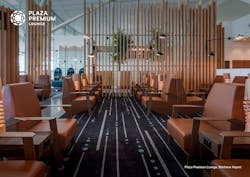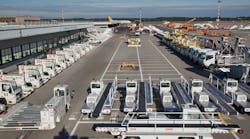What began as an idea in 1998 to offer lounge access to passengers who flew in economy class has turned into Hong Kong-based Plaza Premium Group, the world’s largest independent airport lounge network.
The idea to create the first Plaza Premium Lounge was a simple one, said founder and CEO Song Hoi-see. “I used to work for a bank, and I had the privilege of traveling first or business class, which included lounge access and services,” he recalled.
But after leaving the bank to start his own business, Song began having to fly economy class, since he was paying for flights out of his own pocket. In economy class, you obviously you don’t have access to lounges, he noted.
And 20 years ago, laptop computers needed to be recharged every two hours because the battery only lasted for two hours, said Song. “When I traveled for the bank, I could charge my computer in the lounge. But when I started flying economy, I would have to `steal’ electricity from the public areas in the airport,” he said. “And back then, I faxed a lot of documents, and if you didn’t have lounge access, you didn’t have a place to fax your documents.”
Song said it was frustrating because airlines were only taking care of those who traveled first and business class. “If you look at who buys seats on a plane, only about 10 or 15 percent make up first or business class. The remaining 85 percent make up the economy class. And many of the 85 percent require the services available in a lounge,” he said. “So if I could come up with a concept where a business center and lounge were combined, I could take care of the 85 percent of people who don’t have access to an airline lounge. And I thought that business proposition would work.”
Song opened the first Plaza Premium Lounge in Hong Kong in 1998. “Today, we have 146 lounges worldwide. We are in 35 international airports and are serving 11 million people per year,” he said. That was followed by Kuala Lumpur International Airport in Malaysia, he added.
“I chose Hong Kong because I was working and living there. And Hong Kong had just opened a new airport in 1998. I presented this concept to Hong Kong International Airport, but it took some time to convince them to do it because we were the first one in the world to do it,” said Song.
The second lounge was opened at Kuala Lumpur International because Song is Malaysian. “And it had also opened a new airport, so I also presented the lounge idea to the airport authority and they accepted my concept,” he said.
At the time Plaza Premium began, airports felt that lounges only belonged to airlines to provide services to their premium customers, said Song. “They never had the idea that lounges could be provided to everyone, regardless of the airline or class of service,” he said. “So initially, I went around to see whatever airport would accept me and I’d go ahead and do business with them.”
But after 18 years of growth and success, Song said he is much more careful in selecting which airports get his lounges. “When I want to open a new lounge, I have to be in major airline hubs. After that, I’ll look at secondary cities served by that hub,” he said.
The first North American Plaza Premium Lounge was opened at Vancouver International Airport in 2004. “I opened there because the airport authority saw my concept and invited me to set up a lounge. Vancouver airport is very proactive and one of the best airports in North America,” he said.
And from there, Plaza Premium expanded to Toronto, Winnipeg and Edmonton, said Song. And I’m now beginning to look in the United States. The cluster of lounges in Canada are big enough to help me take care of the United States,” he said.
In 2005, Plaza Premium started managing its first airline lounge, Thai Airways’ Royal Orchid Lounge at Hong Kong International Airport. “Getting into the airline lounge business was not an easy thing. The airlines wouldn’t look at me during the first five years of my business,” he said. “But after seeing how we expanded and the quality of our product, the airlines began to talk to us.”
Airlines running lounges is not their forte, said Song. “They are transportation companies. That’s why they want lounge services to be taken care of by people who know how to run it,” he said.
After 18 years of experience and all the Skytrax awards Plaza Premium has won, it shows the quality that can be delivered, said Song. “Not only do we deliver services on time, we also deliver consistency and quality, which are very important.”
When asked about his favorite lounges, Song chose a few. “If it’s one of the airline lounges we manage, I can tell you very confidently that Cathay Pacific’s lounge at Hong Kong International Airport is one of the best in the world. And it’s right that Skytrax awarded it the best first class airline lounge in the world,” he said.
Looking at independent lounges, Song offered three. “Obviously, I like London Heathrow and Hong Kong. And now I have a new one that opened on December 9 in Rio de Janeiro. It is outstanding.”
Plaza Premium Group got into the airport hotel business in 2014, opening up the Aerotel at Kempegowda International Airport in India. The group’s strength in airports is looking at efficiency gaps and pain points of travelers, said Song. “So after so many years in airports running lounges, we realized that a lot of passengers, especially transit passengers, require a place to take a nap before the second leg of the travelling,” he said. “Or people arrived in the country early in the morning and their hotel was not ready to check in, so they needed a place to rest.”
The purpose of the Aerotel is not to sell 24 hours, said Song. “We are selling six-hour blocks. Our first category of clients arrive at 6:00 in the morning and their hotel is not ready for them to check in until 2:00 in the afternoon. What are you going to do from 6:00 to 2:00,” he asked. “We provide a hotel where you can go to sleep and refresh yourself. Then later, you can go on to do your work and we can send your baggage to the hotel that you’re going to stay in that night.”
The second category of clients are those leaving in the evening after 10:00 p.m., said Song. “But the hotel tells you to check out at 2:00 in the afternoon. So what you can do is check out and come to the transit hotel, where you can take a nap or work for few hours before you fly out,” he said.
The third category of clients are those who travel very early in the morning, said Song. “Can you imagine if your house is two hours away from the airport? If you travel at 6:00 in the morning, you have to wake up at maybe one or two in the morning to travel to the airport,” he said. “At our hotel, you can check in around 11:00 p.m., sleep for five or six hours, wake up in the morning, take a shower and go to your flight.”
Plaza Premium Group currently has six Aerotels, said Song. “In our current plan, we are going to build more in China, including Chengdu, Shanghai, Beijing and Zhengzhou,” he said.”These are the places where major airports are and this concept works very well for them.”
Looking ahead, Song noted that his company will be celebrating its 20-year anniversary in 2018. “In 2015, we created a year-end review that included a three-year plan to 2018. In that plan, we set a target to have 200 outlets by the end of 2018,” he said. “And we plan to put up US$100 million in investment to reach that number.
“In 2017, we have plans to open at least 20 new lounges, so by 2018, we are very confident that we will reach 200 outlets in our Plaza Premium Group,” said Song.


